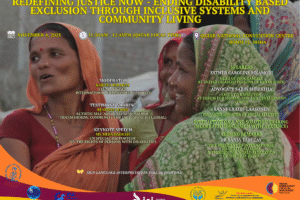
Feb 28, 2007
La CIJ sometió ante la Corte Suprema de la República de Chile un Memorial en Derecho en el marco del proceso de extradición abierto contra Alberto Fujimori Fujimori, por delitos entre los cuales se encuentran crímenes contra la humanidad y graves violaciones a los derechos humanos.
En su Memorial, la CIJ analiza los diferentes temas jurídicos relevantes del caso a la luz del derecho internacional, en particular:
- la obligación de juzgar y sancionar a los autores de graves violaciones a los derechos humanos y crímenes bajo el derecho internacional;
- las nociones de crimen contra la humanidad y graves violaciones a los derechos humanos;
- el régimen jurídico aplicable a los crímenes bajo el derecho internacional;
- las normas ius cogens y las obligaciones erga omnes;
- la jurisdicción universal y el principio aut dedere aut judicare;
- y el principio pacta sunt servanda.
Peru-Chile-extradiction Fujimori-legal submission-2006-spa (full text in Spanish, PDF)

May 25, 2006
En diciembre de 2005, la CIJ sometió ante la Corte Constitucional un Amicus Curiae en el marco de la demanda de inconstitucionalidad contra la ley 975 de 2005, conocida bajo el nombre de “Ley de Justicia y Paz”.
El 18 de mayo de 2006, la Corte Constitucional confirmó en su fallo que varios artículos de esta ley son contrarios a las obligaciones de Colombia bajo el derecho internacional de los derechos humanos.
Colombia-Justice and Peace Law-legal submission-2006 (full text in Spanish, PDF)

Feb 13, 2006
In December 2005 the ICJ published a Memorandum on International Legal Framework on Administrative Detention and Counter-Terrorism.
Since 11 September 2001, administrative detention for security grounds has again become a topical question. This Memorandum tries to compile and systematyse the jurisprudence of international organs and mechanisms and the doctrine related to administrative detention on security grounds.
administrative detention counter-terrorism-legal submission-2006 (full text in English, PDF)

Dec 9, 2005
Summary of submissions by the Commonwealth Lawyers Association, the Human Rights Institute of the International Bar Association and the ICJ.
4. It is understood that the central issues arising in the appeal before your Lordships’ House are those identified by Lord Justice Neuberger at paragraph 291 ii) of the judgment of the Court of Appeal, namely “whether evidence obtained from a third party under torture in another country can be relied upon by the [Special Immigration Appeals Commission “SIAC”] and, if not, the extent of the exclusion of such evidence and the determination of the party on whom the burden of establishing the use or non-use of torture rests”.
5. The CLA, the Institute and the ICJ (“the Associations”) seek to provide an analysis of comparative law of relevance to these issues. The Associations are aware that issues of public international law are to be addressed in submissions to be filed by Amnesty International and others and, while supporting those submissions, the Associations do not intend to duplicate them.
6. The Associations’ submissions may be summarised as follows:
- In those few cases in other jurisdictions where the implications of the torture or inhuman or degrading treatment of a non-party by agents of a foreign State have been considered, the case law, with minimal exceptions {{1}} either holds or strongly suggests that such evidence should not be admitted. This is the case both in the context of criminal proceedings and extradition proceedings;
- The case law of other jurisdictions also indicates that the rationale behind the general prohibition on the admission of evidence of involuntary confessions obtained by torture, inhuman or degrading treatment includes the following elements (i) the inherent unreliability of evidence so obtained (ii) the outrage to civilised values caused and represented by such conduct (iii) the public policy objective of removing any incentive to anybody to undertake such ill-treatment anywhere (iv) the need to ensure protection of the fundamental rights of the party against whose interest the evidence is tendered (and in particular those rights relating to due process and fairness) and (v) the need to preserve the integrity of the judicial process. Each of these aspects of the rationale applies, by parity of reasoning, to support the Appellants’ contention that there should be an exclusionary rule in respect of evidence obtained by the torture or inhuman or degrading treatment of a third party by a foreign State wherever that ill-treatment has occurred;
- The fundamental nature of each element of the rationale set out above indicates that the exclusionary rule is itself of a fundamental nature and is not to be categorised simply as a rule of evidence;
- It is a general principle of the English law of evidence, followed in many other jurisdictions, that a party who wishes to adduce evidence must establish its admissibility. In these circumstances, if an exclusionary rule of the kind contended for by the Appellants is held to exist, it is the Crown which should bear the burden of proving that the evidence is not caught by the rule at least once the individual challenging the admission of the evidence has raised a serious issue that it may have been obtained by torture or inhuman or degrading treatment. That approach also reflects the practical reality as to which party is likely to have greatest access to information bearing upon this issue;
- In the premises, the fundamental principles underpinning the jurisprudence of other major jurisdictions are supportive of the Appellants’ case on this appeal both as to the existence of an exclusionary rule and as to the proper application of the burden of proof.”
[[1]] The sole exceptions identified are two District Court decisions from the United States of America. Each is addressed further below. It is submitted that each is distinguishable from the present case and should not be followed. There are, furthermore, a number of other United States decisions also set out below which favour the Appellants’ position.[[1]]
United Kingdom-appeal A and others torture-legal submission-2005 (full text, PDF)

Aug 18, 2005
The ICJ today called on the Thai Government to amend their new Emergency Decree to ensure it complies both with the Constitution and Thailand’s international human rights obligations.
Press release-2005 (full text in Thai, PDF)
Thailand-summary recommendation-analysis brief-2005 (full text in Tha, PDF)
Thailand-comments draft ISA-legal submission-2007 (full text in English, PDF)








